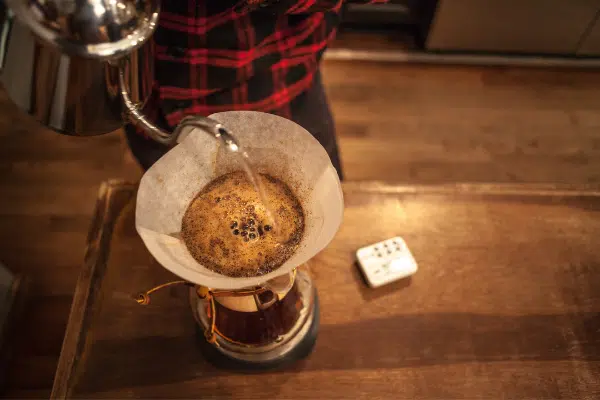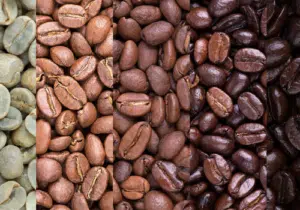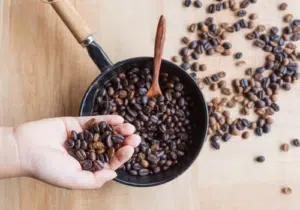Distilled Water For Coffee; Should You Use It?
Disclosure: This post contains affiliate links and I may earn a small commission (at no extra cost to you) if you click through and make a purchase. Thanks in advance – I really appreciate it!
Since 99% of coffee is water, then you probably know that water plays an essential part in the coffee brewing process. Once upon a time, I was under the assumption that the purest water would make the most balanced flavorful coffee. So I decided to test this theory and use distilled water to make my cup of joe.
Key Takeaways:
Can you use distilled water for coffee?
Using distilled water for the preparation of coffee will result in weak and flavorless coffee as distilled water lacks mineral content which is essential for the extraction process. Moreover, using distilled water in a coffee maker increases the risk of corrosion of the internal metal parts.
In this article, we are going to take a close look at the effects of distilled water on the overall coffee extraction process, and how distilled water may or may not affect your coffee maker.
Is It OK To Use Distilled Water To Make Coffee
The most important choice in how you’ll make your morning cup of coffee, besides what kind of bean to use—is the water you are going to use.
Like I said before, coffee is 99% water so if you are like me you might assume that the purest form of water will make the most delicious coffee. When I say purest, I mean distilled water that is free of naturally occurring minerals like calcium, magnesium, manganese, and more.
But after doing some research on this matter and from my personal experience I can tell you that some minerals in water are very important for the proper extraction of coffee. Softer or the more distilled the water is, the weaker and under-extracted your coffee will turn out.
When it comes to selecting the right water for your coffee you have to keep in mind the TDS, (Total Dissolved Compounds). These usually consist of magnesium, calcium, and bicarbonate, the most common mineral elements that have a particularly strong flavor. It’s the balance of these that bring out the sweetness in some beans and the bitterness in others
What Is Distilled Water
Distilled water is steam from boiling water that’s been cooled and returned to its liquid state.
All water, no matter if it comes from a natural spring, artesian well, or regular tap, may have trace but safe amounts of minerals, bacteria, pesticides, and other contaminants.
Distilling rids water of all those impurities. It also removes more than 99.9% of the minerals dissolved in water.
So if you do decide to drink it you might not like the taste because it’s flatter and less flavorful than tap and bottled waters. This is because it lacks essential vitamins and minerals.

How Does Distilled Water Affect Coffee Flavor
The flavor in coffee is mostly contained within the oils within the beans. Brewing coffee or espresso is a matter of extracting these flavors from the beans i.e. the coffee grounds so that they permeate the water.
As we know, to make coffee in a coffee maker or in on a stovetop, the coffee grounds are mixed with near-boiling water. The heat and minerals in the water work together to extract the flavor from the coffee. After a short steeping period, the grounds are filtered out of the mixture, leaving you with water with the coffee flavors extracted from the grounds.
To get a flavorful balanced coffee, there must be some mineral content in the water. If the water is distilled, or if it has been softened too much, the coffee will be under-extracted. and the beverage will be relatively flavorless.
According to the Specialty Coffee Association Of America, water should contain around 150-200 parts per million of naturally occurring minerals to produce the most balanced, and flavorful cup of coffee.
Distilled water only has 9 parts per million of minerals which is less than 6% of the recommended amount for proper extraction.
Lower mineral content results in bitter coffee and flat flavor. On the other hand, if the mineral content is too high (in the case of hard water), the coffee will turn out to be sour and weak.
Can You Use Distilled Water In A Coffee Maker
Using distilled water in a coffee maker will lead to a slow breakdown of its internal metal parts. Since distilled water doesn’t contain its own minerals, it has a tendency to attract metal ions from the internal components of a coffee maker. This slowly breaks down the coffee machine.
The only benefit of using distilled water in a coffee maker is that it can reduce the need for cleaning. Because distilled water is stripped of magnesium and calcium—the primary minerals, unfortunately, that allow water to retain flavor—using it in your coffee maker will result in less build-up of minerals in the internal mechanisms and reservoir.
Can You Use Distilled Water In A Keurig?
Using distilled water in a Keurig will produce a flavorless coffee. Moreover, most Keurig machines are built with sensors that detect the mineral content in water. If there’s no mineral content, as is the case with distilled water, the machine will not be able to detect water in the reservoir.
Instead of distilled water, you can try using bottled filtered water, or you can try filtering your tap water through a home filter. Filters will eliminate the smell and taste of chlorine, sulfur, and iron as well as some minerals. Your Keurig coffee maker will last longer and will keep on producing better-tasting coffee and tea.
Can You Use Distilled Water In A Nespresso?
Using distilled water in a Nespresso machine will lead to a slow breakdown of its internal metal components. Distilled water lacks its own minerals but it has a tendency to attract metal ions from the internal parts of a machine. Over time this causes corrosion and breakdown of the machine.
I highly recommend using bottled water or filtered tap water to make coffee in your Nespresso. Using a water filter at home will remove some, but not all dissolved minerals. So you’ll have less scale build-up but the filtered water will not be pure enough to cause damage to metal parts.
What Is The Best Water For Coffee Maker?
The best water for a coffee maker should be clean, fresh, and filtered. The water should have a mineral content of around 150 parts per million (ppm), and a pH of 7.0 (neutral). With filtered water, you’ll get enough minerals for coffee flavor without having to descale your machine constantly.
What seems like a simple coffee component, actually can get quite scientific when you factor in specific taste. For instance, In certain cases, two alternate cups made with exactly the same beans can taste completely parallel to each other when made from different water sources.
The major consideration concerning water for coffee brewing is softness. The Specialty Coffee Association’s water standards give an ideal target as water with the following characteristics: no odor or color, zero chlorine, a pH of 7.0, alkalinity of 40 ppm; and calcium hardness of 50-175 ppm.
What Is The Best Water For Espresso Machine?
The best water for an espresso machine should be filtered, clear, and fresh with a TDS (Total Dissolved Solids) of 90-150 ppm, a pH of 7.0 with no extraneous odors or flavors. The water should have enough TDS that the minerals in the coffee are able to help do the work of extraction.
The water you put into your espresso machine is incredibly important and goes far beyond brewing good coffee. Putting good, clean water into your espresso machine will extend the life of your investment, and can help your machine continue to run well.
When it comes to brewing coffee, it’s important to understand that the more mineral content water has, the less it can take in from coffee, typically. Some minerality is good, too much is bad. The mineral content of water is expressed as the Total Dissolved Solids (TDS), and measured in Parts Per Million (ppm).
Checking your water hardness cannot be stressed enough because water that is too hard can cause excessive scale buildup inside your machine. This will reduce heating efficiency, can clog water passages, lead to inaccurate readings from temperature and level probes, and cause the failure of valves and seals.
I recommend using a TDS meter or water hardness test strips. These test strips will allow you to measure exactly how hard your water is. I recommend using a water softener if you get a measurement above 85 ppm.

Amit Gupta
Hi, my name is Amit Gupta, and I am the owner and contributor at Cafeish. My obsession with coffee started when I received my first French press as a gift almost ten years ago. Since then, my love of coffee – and the number of coffee gadgets I own – has grown considerably.
Most Popular
ABOUT US
We are a team of coffee affcianados with experience and expertise in making world renowned coffee. In fact, preparing the best coffee ever with a fluffy top reminds us of magic, with secrets of how to achieve each particular effect. Making coffee is not our only hobby, we always keep our ears open as to what’s happening around and what scientists and manufacturers produce for consumers. It’s not an easy task to do – it’s rather time consuming. Hence, Caféish website was launched.
LEGAL DISCLAIMER
Caféish is a participant in the Amazon Services LLC Associates Program, an affiliate advertising program designed to provide a means for sites to earn advertising fees by advertising and linking to Amazon.com. Caféish also participates in affiliate programs with Clickbank and other sites. Caféish is compensated for referring traffic and business to these companies.




